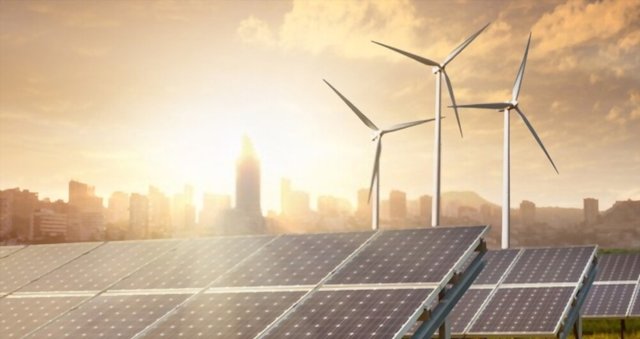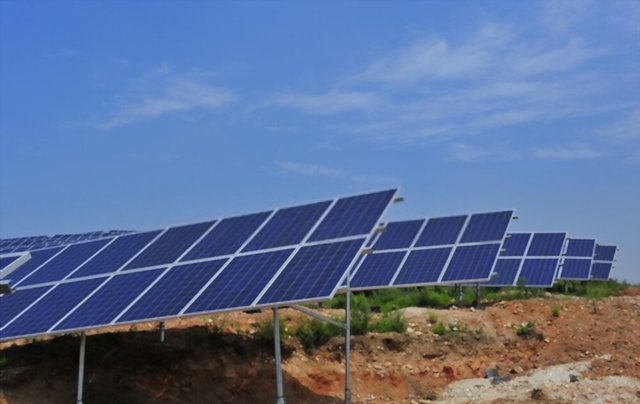
If you haven’t been living under a rock for the last couple of decades, you’ve probably heard about solar energy, but what exactly is it? How does it work? How much does it cost to install solar panels on your home or business and what are the long-term savings? This article will answer all of these questions to help you determine if solar is right for you.
- What are solar panels and how do they work?
Solar panels are devices that collect sunlight and convert it into electricity to be used in homes and businesses. - How much electricity does a solar panel produce?
The amount of electricity produced by a solar panel depends on the size of the panel and the amount of sunlight that it is exposed to. - How much electricity is produced at a given time? The amount of electricity sent from the power grid to appliances is referred to as Qualitative AC Power (QAP). While QAP is measured in Watts, the amounts of watts that are sent to various appliances are referred to as Quantitative AC Power (QAP). Perry Global Power assumed that every kilowatt of electricity (kWh) is generated by a traditional power plant. A solar panel has a quantity referred to as a PVOutput during its generation and can produce electrical energy.
- How many panels do I need for one solar system?
The entire process of installing a solar system requires several people, including roofers, installers, or contractors. Solar systems range in size from small units installed on single houses to large commercial complex sizes. For a single-family house installation, a 5kw system does not require a contractor, it is simple to install. However, a 700 square foot (93 square meters) roof can require larger panels, typically 30–40kw. - How much Unrivaled solar is produced by solar panels?
Unrivaled solar power is produced mostly by concentrating solar power, where sunlight is collected by a panel and used for heat. Concentrating solar power emits no pollution or fire hazard. Per Watt, Unrivaled solar produces approximately 15,000kWh of electricity. (11,700Wh x 5kW = 15,200Wh) - What is the advantage of buying Unrivaled solar power from a solar company?
Because only one company is currently selling Unrivaled power, this market is very competitive. - How much Solar insurance can I get?
Solar insurance is generally available to all homeowners that have installed solar systems on their home. The premium varies depending on the policy. - What are the benefits of installing solar panels at home or on your business?
Solar power is one of the cleanest and most efficient sources of renewable energy. It harnesses the power of the sun to generate electricity that can be used to power buildings, homes or businesses. It’s a great way to reduce your carbon footprint and lessen your reliance on fossil fuels.
The first step is knowing where to get started. Don’t worry if you think solar isn’t for you — research shows it’s easy to start and grow a business selling solar products. This guide will guide you through not just the steps to get started but also steps for scaling your business. If you’re ready to take on the next steps of your sustainable energy journey, grab your notebook and get going. As the name suggests, a solar company makes and sells solar panels for use on roofs, houses, or businesses. Solar is one of the cheapest forms of renewable energy available, and once people realize how much money they can save by installing solar panels, they will be more than willing to purchase them. But what you should know is that it is easy to get started with solar as long as a few things are taken care of. Here, we’ll discuss these tips to make it easy as possible to scale your business selling solar.
The first step to take when selling solar is to find a national distributor. There are many solar distributors, but the primary types of distributors are independent installers or utilities. Independent installers provide the installation services. An installer will install a panel on a roof or new window using a pre-made installer kit.
Independent installers ask résumés (headshots) and references of people you would like to work with so they know who to contact ahead of time. It’s not a guarantee, but a good way to start to build connections. Résumé and reference checks help make sure people are ready and able to work with you. - How much does it cost to install solar panels on your home or business?
The cost of solar panels will vary depending on your location, the size of the system you’re installing, your roof’s configuration, and the quality of the panels you purchase.
You can invest in a home or business solar system with an 1800 watt or less system installed on your roof. The cost of installing a system with more than 1800 watts is more expensive. If you have a large system on your roof, there is an even greater difference in cost. To help you calculate the cost of your roof’s solar installation, we’ve compiled a comprehensive guide to help you compare different systems, calculate incentives, and determine financing options. Cost of a residential solar system (alone or with PV array) Tracking your system’s cost is an important step when planning for your solar investment. The federal government offers three different financial incentives to homeowners depending on how much they spend on solar panels, the size of the roof they install, and whether they install a PV array. We’ve broken down the cost of installing a single residential solar system (differing in size based on state) and encouraged you to get in touch with your local municipal government to understand local incentives. You can look up your local government on OpenSecrets.org and use the filter on the “Minority/Women/elderly” category to find your local programs.
In order to meet government requirements for using renewable energy resources, installers must first determine if your home meets energy certification requirements (heating and electrical service) or whether the panels are of the right type and receive an appropriate return on investment. To install your solar panels on your home, you’ll need to first create a panel model that includes all necessary dimensions (length, width, height, mounting hardware, and warranty information). The questions below help determine if your panel(s) is right for you and if you qualify for the various federal and state incentives. - Are there different ways to finance the installation of solar panels? Conclusion: If you’re looking for a way to save money on your energy bills, lower your carbon footprint and help the environment, then solar is definitely worth considering.
Solar power is a great way to generate power for your home and to save money on your energy bills. If you’re thinking about making the switch to solar, then it’s important to know how to finance the installation of solar panels at your home. Here are a few options that are worth considering.
A recent report from Tesla Research found that the cost of homeowners’ rooftop solar power systems is trending at a steady 8–9% per year. ( Read more about the cost of solar power in your state.) In general, system prices have been trending upwards, which means that the cost of installing a solar power system on a home has remained fairly stable. If you’re lucky enough to have access to the financial resources that you can get through a funding source, solar power could be a cost-effective option for you. Even if you don’t have enough cash to pay for your own system upfront, purchasing a loan through a Solar Job creator could help ease the financial burden during the initial setup. While I wouldn’t recommend doing this if you don’t have a strong financial history, there are some companies that provide financing for homeowners who have a strong loan history.
First Solar takes this a step further by offering a 2-year finance option that provides homeowners with a loan amount with 0% interest. With this option, you would need to pay back the loan after two years. If you were aiming to install a system in 2021, this would be a great option.
In Puerto Rico, First Solar has a 2-year program that offers to finance of $.25 per watt for small to medium-sized residential systems and homeowners with household incomes of less than $47,000 per year.
Right now, First Solar is only available in Puerto Rico. It looks as though they will be expanding throughout the US.
Since the economic situation made it tough for most people to access credit at this time last year, Greentech Media suggests that the hybrid solar-renewable energy option could be an option when funding becomes available.
If you’re looking for a way to save money on your energy bills, lower your carbon footprint and help the environment, then solar is definitely worth considering.
Solar energy is a really easy way to lower your carbon footprint and help the environment, and it’s also a more cost-effective way to heat or power your home or business. If you’re looking for a way to save money on your energy bills, lower your carbon footprint and help the environment, then solar is definitely worth considering.
I remember waiting tables in college to help pay for university fees and living an eye-watering amount of debt. When my mortgage payment was due, I’d often pack a bag and look for work. A strange job as an unpaid intern for an environmental NGO didn’t exactly set me up for a successful career in the future. So I left college, quit my unpaid internship, and took an entry-level office job in a supermarket to save some money. I only worked there for a few months before I discovered solar panels were much more affordable than expected. As a direct result of this, I’ve not only paid off my student loans over the last six years but have also been more financially secure and environmentally responsible during that time as well. Because solar panels are so affordable, many people looking to buy or build their first home or business will think of this investment as a no-brainer. And in some ways, it is; the panels you buy will directly save money for quite some time. If you look beneath the shiny surface of shiny profit-making schemes however, something much more underhand is going on: centralized finance. Financing wind and solar without local regulation have mostly been done by monopolistic utilities, which make enormous profits by selling power around the clock at ridiculously low prices.
While this certainly looks like an obvious reason not to invest in solar, the fossil fuel industry doesn’t actually have much to do with it. The finance sharks are all bankrolled by the money extracted from the local communities, communities of color, and the planet. The companies in question literally have control over the infrastructure of the entire map, and extract huge profits from the same people who already have huge amounts of debt.
